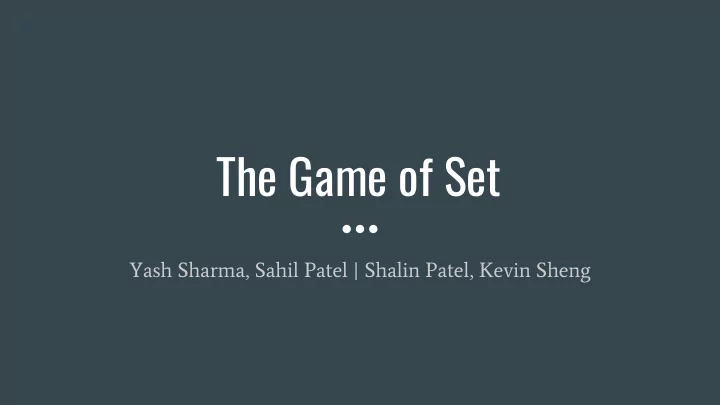

The Game of Set Yash Sharma, Sahil Patel | Shalin Patel, Kevin Sheng
Design Goals Goals: ● Robust & Reliable Smooth User Experience ● Modularity ●
Authentication
Lobby + Room
Game
Client-side Decisions JavaFX8 vs Swing ● Minimizing Logic ● ○ Client avoids logic as much as possible to avoid inconsistency. UI elements send messages and updates are performed based on data in received responses. ○ ● Multithreading (Task and runLater) All game and window state updates are handled in one Task , which runs outside of the main GUI ○ thread. Allows updates without freezing UI. ■ Task is within its own class, separating UI from logic and data. ■ Manipulates 4 scenes, each its own object. ■ Within this task, UI updates are called with Platform.runLater, which allows adds the update into a ○ queue for the main GUI thread to run as soon as possible.
Database Decisions MySQL ● Hand out connection for every interaction ● ● Created objects to simplify queries into function calls
Server-side Decisions Multithreaded design ● Main process ○ Player thread ○ Game thread ○ Thread communication via pipes ○ Class to store player info ● ○ username Input/Output stream objects ○ ○ References to pipes between player & game threads
Server-Client Communication Decisions Publish-Subscribe: ● Server publishes messages to users subscribed to that specific event Ex: When a user clicks on the SET button, the user sends out a SetSelectMessage, ● and all users currently in the game receive a SetSelectResponse.
Server-Client Communications Messages/Responses: ● Object Hierarchy approach Each Message is its own class that inherits from a Sendable interface ○ Allows for easy sending to clients/server ○
Questions?
Recommend
More recommend